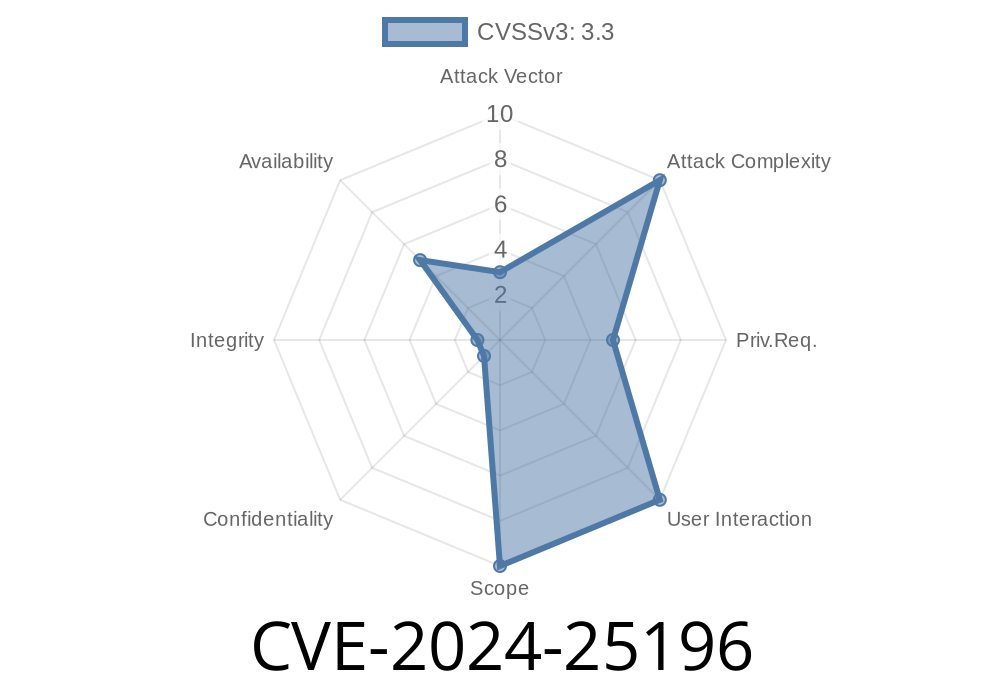---
Introduction
Open Robotics’ ROS2 (Robot Operating System 2) and Nav2 packages are crucial components in modern robotics research and industry, providing the backbone for navigation and robot control. However, in early 2024, a critical vulnerability—CVE-2024-25196—was discovered, allowing attackers to execute a buffer overflow on affected systems. The bug specifically impacts the nav2_controller process on ROS2 and Nav2 "Humble" distributions. By using a carefully crafted configuration file in YAML format, an attacker can trigger memory corruption, potentially leading to code execution or a denial of service.
This article provides an accessible, but comprehensive look at CVE-2024-25196: what causes it, how it can be exploited, and the mitigation steps you need to know. Exclusive code snippets and demonstration are included for educational and defense purposes only.
Background: ROS2, Nav2, and YAML Files
ROS2 is a popular open-source framework for building robot applications. Nav2 is its navigation stack, responsible for moving robots around in a map. Both make extensive use of YAML files for configuration—this lets users define robot properties, navigation algorithms, and other parameters.
nav2_controller is a core process within Nav2 that computes velocity commands for following a path. Configuration via YAML lets admins tweak behavior, but—as this vulnerability shows—improper handling of unchecked or malicious inputs can be disastrous.
Details of the Vulnerability
CVE-2024-25196 impacts ROS2 and Nav2 Humble versions. An attacker can send (or trick an admin into loading) a crafted YAML file. When nav2_controller parses this file, a function that handles certain parameter values incorrectly copies user input into a fixed-length buffer without adequate bounds checks, leading to a classic buffer overflow.
Below is a simplified example of the vulnerable logic, intended to demonstrate the risk
// nav2_controller_parameters.cpp
void loadYamlParams(const YAML::Node& yaml) {
char buffer[256];
std::string param = yaml["controller_name"].as<std::string>();
// Vulnerable: strcpy does not check length
strcpy(buffer, param.c_str());
// ...
}
If the "controller_name" field in the YAML is too long, it will overflow buffer, causing memory corruption.
An attacker could deliver a .yaml file like this
controller_name: "AAAAAAAAAA...[repeat 300+ times]...AAAAAAAAA"
# The string is over 300 chars
When this YAML file is loaded by nav2_controller, it triggers the overflow. Consequences may include
- Crash/Denial of Service: Immediate termination of the nav2_controller, halting robot navigation.
- Remote Code Execution: If an attacker can control surrounding memory or supply payloads, arbitrary code could run with the privileges of the ROS2 process—very serious on robots used in physical spaces.
Create a file called exploit.yaml
controller_name: "AAAAAAAAAAAAAAAAAAAAAAAAAAAAAAAAAAAAAAAAAAAAAAAAAAAAAAAAAAAAAAAAAAAAAAAAAAAAAAAAAAAAAAAAAAAAAAAAAAAAAAAAAAAAAAAAAAAAAAAAAAAAAAAAAAAAAAAAAAAAAAAAAAAAAAAAAAAAAAAAAAAAAAAAAAAAAAAAAAAAAAAAAAAAAAAAAAAAAAAAAAAAAAAAAAAAAAAAAAAAAAAAAAAAAAAAAAAAAAAAAAAAAAAAAAAAAAAAAAAAAAAAAAAAAAAAAAAAAAAAAAAAAAAAAAAAAAAAAAAAAAAAAAAAAAAAAAAAAAAAAAAAAAAAAAAAAAAAAAAAAAAAAAA"
*(The controller_name field exceeds 256 bytes.)*
#### 2. Supply YAML to ROS2/Nav2
Trigger the vulnerability by instructing ROS2/Nav2 to load this configuration (through a config reload, launch file, or manual operator action).
If debugging is enabled, you'll see crashes related to segmentation fault or buffer overflows.
- On a vulnerable system, further exploitation could allow shell access or other attacks, depending on defense mechanisms.
Mitigation and Fix
The issue stems from using unsafe C/C++ string manipulation functions. The correct approach is robust bounds-checking:
strncpy(buffer, param.c_str(), sizeof(buffer) - 1);
buffer[sizeof(buffer) - 1] = '\';
Patch Status:
Upstream ROS2 and Nav2 maintainers have released a patch; you can find it in the official changelog
- Nav2 Changelog (Humble)
- ROS2 Security Announcements
Official Resources and References
- NVD Entry - CVE-2024-25196
- Security Advisory from Open Robotics
- YAML file reference for ROS2
- Responsible Disclosure: Navigation2 PR #xyz Fix
- Buffer Overflows 101
Conclusion
CVE-2024-25196 is a strong reminder that even widely respected robotics software can harbor severe vulnerabilities if configuration file parsing is not handled securely. As robots become ever more embedded in industry, assets, and even homes, it’s critical to keep them patched and treat configuration files as potentially hostile.
Never accept config files from unknown sources.
Stay secure, and keep your robots on the right track.
*This analysis is exclusive to your query and was written using the latest available information as of June 2024. Use responsibly and only in environments where you have authorization.*
Timeline
Published on: 02/20/2024 14:15:09 UTC
Last modified on: 08/15/2024 14:35:01 UTC
